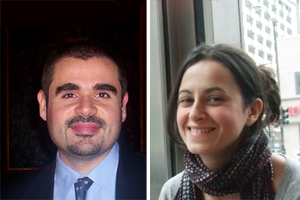The Binge Eater as Junkie
Researchers find similarities in food, alcohol, and drug cravings

As any dieter or bulimic will tell you, food can feel as dangerous and soul-possessing as a street drug.
Now a research team, including BU scientists, has shown that the brain activity of rats who binge on a sugary diet — “palatable foods,” in scientific parlance — and then are forced to abstain, is similar to the stress and anxiety addicts feel deprived of their drug of choice. Those feelings often lead to a relapse.
Eating disorders and obesity are multifactor afflictions. But “palatable foods are believed to play a major role,” says Pietro Cottone, a School of Medicine assistant professor and codirector of the Laboratory of Addictive Disorders (LAD) in the department of pharmacology and experimental therapeutics.
Cottone along with Valentina Sabino, a MED assistant professor and LAD codirector, and Eric Zorrilla, associate professor at the Scripps Research Institute, published their research in the journal Proceedings of the National Academy of Sciences. Contributing to the paper were scientists from the University of Roma La Sapienza, the National Institute on Drug Abuse and the National Institute on Alcohol Abuse and Alcoholism of the National Institutes of Health (NIH), and biopharmaceutical company Neurocrine Biosciences.
Cottone defines palatable food as something acceptable to the taste. And while tastiness is subjective, he notes an evolutionary role: successful humans seek out nutrient-rich energy sources in the environment.
“We evolved over millions of years to defend ourselves against scarcity, and palatability helped us during this long process,” he says. “But now there is an abundance of palatable food. We don’t have to fight or expend much energy to find food. It’s easy. Palatability is now working against us.”
Palatable food remains a strong activator of the brain’s reward system, but in certain conditions he says there is “a shift from eating food for pleasure to eating food compulsively to avoid anxiety and psychological malaise.”
To measure the neurobiological response to abstention and relapse, Cottone and his colleagues studied the behavior of 155 rats, dividing them into two groups. The first ate standard chow for five days, followed by two days of a high-sugar, chocolate-flavored diet. The second group consumed only standard fare. In both cases, meals were unlimited.
After getting a taste of sweet food, rats in the first group were less motivated to eat standard meals, even refusing food that had been acceptable earlier. They also exhibited anxiety. When returned to palatable food, they overate, but their anxiety-related behaviors subsided.
Dieters often fall prey to this cycle, Cottone says, especially when they give themselves a “free day” in their eating schedule.
The research team then looked at the brains’ stress systems. They found that during withdrawal from palatable foods, the rats showed increased corticotropin-releasing factor (CRF) gene expression and peptide in the amygdala, an area of the brain involved in fear, anxiety, and stress responses.
CRF is considered a key stress neurotransmitter, and when the team blocked the receptor, the behavioral consequences of palatable food withdrawal vanished.
While the research is in the earliest stages, Cottone says, the results of the study could translate into another weapon for dieters, and more important, for those struggling with stubborn eating disorders.
“We think we have found a new way,” he says, “a new hope we can work on.”
Caleb Daniloff can be reached at cdanilof@bu.edu.
Comments & Discussion
Boston University moderates comments to facilitate an informed, substantive, civil conversation. Abusive, profane, self-promotional, misleading, incoherent or off-topic comments will be rejected. Moderators are staffed during regular business hours (EST) and can only accept comments written in English. Statistics or facts must include a citation or a link to the citation.